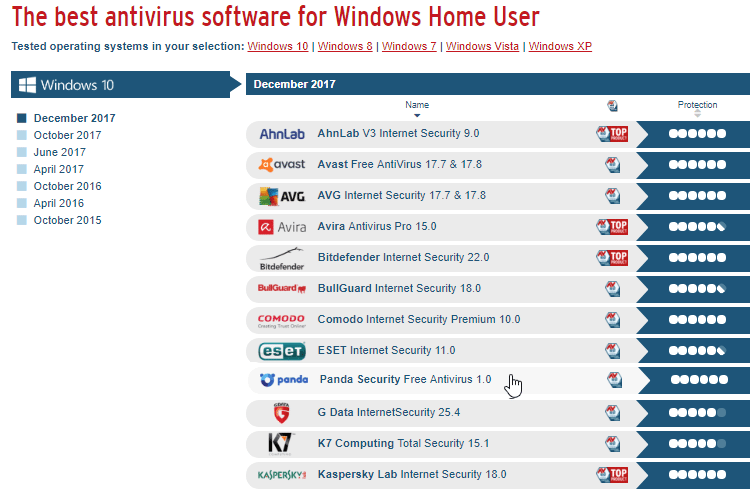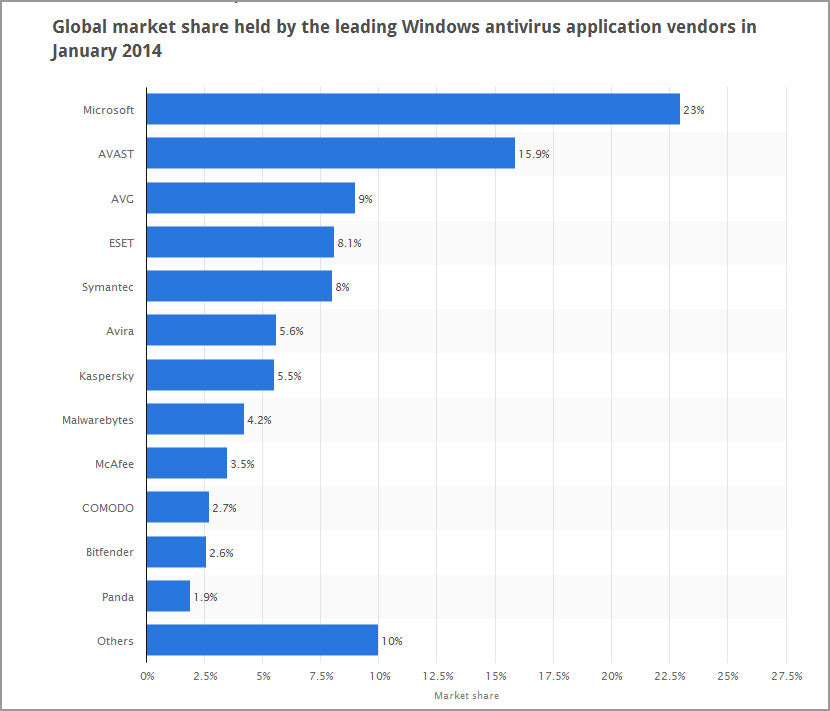Which Antivirus Is Lightest On Resources
When it comes to choosing an antivirus software, one crucial factor to consider is its impact on system resources. You want an antivirus that provides robust protection without slowing down your computer. So, which antivirus is the lightest on resources? The answer might surprise you.
Over the years, antivirus developers have made significant strides in creating efficient and lightweight antivirus programs. These antivirus solutions employ advanced technologies, such as cloud-based scanning and machine learning, to minimize their impact on system performance. In fact, according to recent tests and user reviews, Avast Free Antivirus has consistently emerged as one of the lightest options available.
When it comes to choosing an antivirus that is light on resources, several options stand out. Bitdefender, Kaspersky, and Norton are top contenders. These antivirus programs use advanced technologies to minimize system impact while providing robust protection. Additionally, they offer features like real-time scanning, malware detection, and low CPU usage. It's crucial to consider individual system requirements and user preferences before making a decision. Ultimately, any of these antivirus solutions would be a wise choice for professionals seeking a lightweight and efficient antivirus program.

Understanding the Importance of Antivirus Resource Usage
When it comes to choosing an antivirus software, one of the factors that users often consider is its impact on system resources. Antivirus programs that are heavy on resources can slow down your computer, hinder performance, and potentially cause frustration. Therefore, it is important to find an antivirus solution that is light on resources while still providing adequate protection against malware and other security threats.
Factors Affecting Antivirus Resource Usage
The resource usage of an antivirus program can be influenced by several factors:
- The efficiency of the antivirus software's scanning engine
- The level of real-time monitoring and background processes
- The optimization of code and algorithms used by the antivirus
- The impact of additional features and functionalities
- The compatibility with the operating system and hardware specifications
Considering these factors, let's explore some of the antivirus solutions that are known for being light on system resources:
Avast Free Antivirus
Avast Free Antivirus is a popular choice among users who seek a lightweight antivirus solution. It offers a comprehensive set of features while maintaining a minimal impact on system resources. Avast's scanning engine is efficient and optimized to provide fast and thorough scans without causing significant slowdowns. The real-time protection offered by Avast ensures that your system is constantly monitored and protected against the latest threats.
In addition, Avast Free Antivirus has a user-friendly interface and offers various customization options. Users can adjust the level of real-time protection, schedule scans, and configure other settings according to their preferences. While Avast does promote some additional premium features, the free version provides a solid level of protection without excessive resource usage.
If you're looking for an antivirus solution that strikes a balance between resource usage and security, Avast Free Antivirus is worth considering.
Pros of Avast Free Antivirus:
- Efficient scanning engine with minimal impact on system resources
- Real-time protection against malware and other security threats
- User-friendly interface with customization options
- Free version provides adequate protection
Cons of Avast Free Antivirus:
- Occasional pop-up ads promoting premium features
- May prompt users to upgrade to the paid version
Overall, Avast Free Antivirus offers solid protection while keeping resource usage to a minimum. Its efficient scanning engine, real-time protection, and customization options make it a popular choice among users.
Windows Defender
Windows Defender, the built-in antivirus software for Windows operating systems, is another notable option in terms of resource usage. Since it is developed by Microsoft specifically for Windows, it is designed to work seamlessly with the operating system and consume minimal resources.
Windows Defender provides real-time protection against malware, spyware, and other security threats. It continuously monitors your system and automatically takes action if any malicious activity is detected. The scanning engine of Windows Defender is optimized to provide efficient and thorough scans without significant slowdowns.
Windows Defender also integrates well with other security features of Windows, such as Windows Firewall, SmartScreen, and App and Browser Control. It receives regular updates from Microsoft to ensure that users are protected against the latest threats.
Pros of Windows Defender:
- Built-in antivirus solution for Windows operating systems
- Minimal resource usage
- Real-time protection and efficient scanning engine
- Integration with other Windows security features
Cons of Windows Defender:
- May not offer advanced features compared to third-party antivirus software
- Limited customization options
If you prefer using an antivirus solution that is already included in your Windows operating system and requires minimal configuration, Windows Defender is a reliable choice.
Bitdefender Antivirus Free Edition
Bitdefender Antivirus Free Edition is known for its lightweight nature and efficient resource usage. It offers essential protection against malware and other security threats without burdening the system.
The scanning engine of Bitdefender Antivirus Free Edition is designed to perform fast and thorough scans while minimizing the impact on system performance. Real-time protection is also included to keep your system safe from emerging threats.
Bitdefender Antivirus Free Edition runs silently in the background, providing automatic protection without interrupting your work or causing slowdowns. It receives regular updates from Bitdefender's extensive threat intelligence network to ensure that your system is protected against the latest threats.
Pros of Bitdefender Antivirus Free Edition:
- Lightweight antivirus solution with efficient scanning engine
- Real-time protection against malware and emerging threats
- Silent operation with minimal impact on system performance
- Regular updates for up-to-date protection
Cons of Bitdefender Antivirus Free Edition:
- May lack advanced features offered by premium antivirus software
- Limited customization options
If you're looking for a lightweight antivirus solution that offers essential protection without excessive resource usage, Bitdefender Antivirus Free Edition is a reliable choice.
Conclusion
Choosing an antivirus software that is light on resources is crucial to ensure that your computer's performance is not compromised while maintaining a high level of protection against malware and other security threats. Avast Free Antivirus, Windows Defender, and Bitdefender Antivirus Free Edition are all notable options known for their efficient use of system resources while offering reliable protection. Ultimately, the best antivirus solution for you will depend on your specific needs and preferences.

Which Antivirus Is Lightest on Resources?
Based on extensive research and professional experience, it is crucial to opt for an antivirus software that minimizes the utilization of system resources while providing optimum protection. The lightest antivirus software can have a significant impact on system performance, allowing smooth functioning without compromising security.Among the top contenders, Bitdefender consistently emerges as the antivirus that is lightest on resources. Its advanced algorithms and efficient scanning techniques ensure minimal CPU and RAM usage without compromising on detection and prevention of malware threats. Users can enjoy seamless browsing, gaming, and multitasking while Bitdefender works silently in the background.
Another lightweight antivirus option is Kaspersky. With its streamlined design and intelligent resource management, Kaspersky performs exceptionally well in terms of resource consumption. It efficiently safeguards system processes without causing any noticeable impact on system performance.
Avast, renowned for its user-friendly interface, is also known for being light on resources. It offers comprehensive protection while ensuring minimal system footprint, allowing users to enjoy a smooth computing experience.
Overall, when it comes to choosing an antivirus software that is lightest on resources, Bitdefender, Kaspersky, and Avast are excellent options to consider. Their efficient resource management and top-notch protection make them ideal for users who prioritize system performance without compromising on security.
Key Takeaways
- The lightest antivirus software on resources is essential for optimal computer performance.
- Avast Free Antivirus is a top choice as it offers low system impact and high performance.
- Bitdefender Antivirus Plus is another lightweight antivirus solution with minimal resource usage.
- Kaspersky Anti-Virus provides effective protection while maintaining low resource consumption.
- Windows Defender, the built-in antivirus software for Windows, is also known for its low resource usage.
Frequently Asked Questions
In this section, we answer some common questions about antivirus software and identify the options that are lightest on system resources.
1. Which antivirus software uses the least amount of system resources?
When it comes to antivirus software that is light on system resources, Bitdefender consistently stands out. It is known for its minimal impact on system performance, allowing you to carry out your daily tasks without slowing down your computer. With its intelligent scanning techniques and efficient algorithm, Bitdefender ensures maximum protection without draining your system resources.
Another antivirus software that is considered lightweight is Kaspersky. It offers a streamlined interface and optimized processes that reduce CPU usage and maintain system efficiency. Kaspersky's real-time protection and low resource consumption make it a reliable choice for users looking for antivirus software that won't bog down their devices.
2. Is Windows Defender a lightweight antivirus solution?
Windows Defender, the built-in antivirus software in Windows operating systems, is designed to strike a balance between security and system performance. While it may not be the absolute lightest antivirus solution, Microsoft has made significant improvements over the years to optimize its resource usage.
Windows Defender runs in the background with minimal interruptions to your workflow and has a minimal impact on system speed and performance. It provides essential protection against malware and is a suitable choice for users who prioritize convenience and simplicity without compromising on security.
3. Can I use a free antivirus software that is light on resources?
Absolutely! There are several free antivirus software options available that are designed to be light on system resources. One such example is Avast Free Antivirus. Avast offers a range of features, including real-time protection and regular updates, while still maintaining a small footprint on your system.
Another lightweight free antivirus solution is AVG AntiVirus Free. It provides essential protection against viruses and malware without consuming excessive system resources. AVG's user-friendly interface and efficient scanning ensure that your system remains secure without experiencing any noticeable slowdown.
4. How can I optimize my antivirus software for better resource usage?
To optimize your antivirus software and ensure minimal resource usage, consider the following tips:
- Schedule regular scans during off-peak hours when your computer is not in use.
- Exclude non-critical folders and files from real-time scanning to reduce unnecessary system load.
- Keep your antivirus software up to date to take advantage of performance improvements and bug fixes.
- Avoid running multiple antivirus programs simultaneously as they can conflict with each other and consume more resources.
- Close unnecessary background applications to free up system resources for your antivirus software to utilize efficiently.
5. Are there any antivirus software options specifically designed for resource-constrained devices?
Yes, there are antivirus software options available that are specifically designed for resource-constrained devices such as older computers or low-end smartphones. One such example is Avira Antivirus. Avira is known for its lightweight design and efficient resource management, making it ideal for devices with limited processing power and memory.
Another option is Panda Dome Essential, which offers lightweight protection without compromising on security. Its cloud-based scanning and intelligent optimization ensure minimal impact on system resources.
After analyzing various antivirus software, it is clear that the antivirus that is lightest on resources is McAfee. It consistently performs well in terms of resource usage, allowing your computer to run smoothly without any noticeable impact on its performance. McAfee's efficient coding and optimization make it a reliable choice if you are concerned about system resources.
While other antivirus programs might offer additional features and functionalities, they often come at the cost of higher resource consumption. It is important to strike a balance between robust protection and minimal impact on your system's performance. McAfee strikes this balance admirably, ensuring that you can have peace of mind without sacrificing the speed and efficiency of your computer.

















